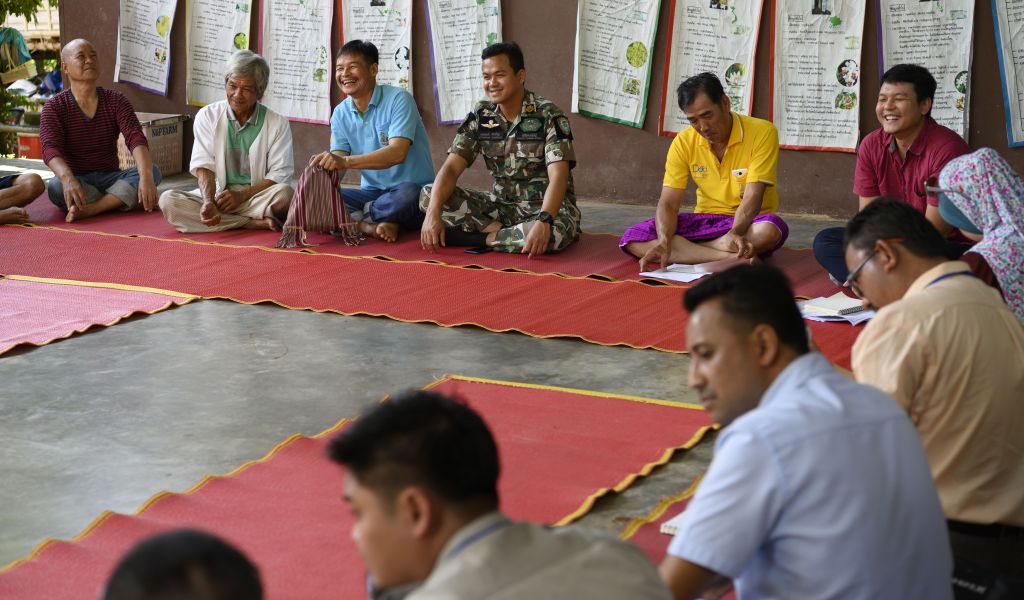Malaysian forestry officials visit two communities to learn from Thailand’s experience in conservation

The creation of national parks around the world has exacerbated conflict between local communities and governments in cases where communities are left out from conservation efforts. In Malaysia, government officials are looking for alternative paths to resolve people-park conflicts, learning in the process from Thailand’s experience in community forestry.
“We observed different approaches on how tenure rights, policy implementation, and other issues we face with social forestry [alternate term for community forestry] in Malaysia are dealt with in Thailand,” said Elne Betrece Johnlee, a researcher at the Forest Research Center in Sabah, East Malaysia. “We learned how they have overcome these challenges and how government organizations can reach a common ground and an agreement with communities.”
Betrece was one of six government representatives from Peninsular and East Malaysia who visited two communities in Thailand from 8 to 10 October 2019 and spoke with officials from the country about the new set of forestry laws the Kingdom adopted earlier in 2019.
The Community Forestry Act, which took Thailand 28 years to develop, was passed in February of this year.
Four months later, in June, Thailand’s government unveiled the National Parks Act.
Siripong Choosen, a forestry technical officer at Thailand’s National Park, Wildlife and Plant Conservation Department, told the Malaysian government representatives that one of the main intentions of the new National Parks Act is to solve the problem of people living in forest conservation areas. The law ensures that communities who have traditionally lived in or near national parks can continue to access the park’s resources.
Yet land rights groups in Thailand believe that the law provides the government with more power, leaving communities vulnerable.
The Malaysian representatives were able to gain insight from both community members and the government when they traveled to Baan Samakkee Dham Village and Baan Hua Hin Dum Village in Thailand’s Kanchanaburi and Suphanburi Provinces.
Baan Hua Hin Dum, a Karen village, is partly in the Ong Phra-Khao Phu Rakam-Khao Huay Phlu national reserve and the Pu Toe National Park. The area faced large-scale deforestation at the hands of a logging concession in 1974. By 1994, community members had formed a group to conserve and regenerate the forest while continuing their traditional practices.
The National Park was declared in 1998, but in contrast to previous conflicts between Karen communities and the Thai state, a process of consultation and negotiation attempted to solve conflicting land claims.
“We had the chance to observe from the government’s point of view and the community’s,” said Betrece about the field visit.
By listening to both sides, the Malaysian forestry officials gained a better understanding of how participatory decision-making, the bedrock of community forestry, can help resolve conflict and address a specific community’s needs.
“I’ve learned that Thailand has come a long way in social forestry and that is has been a challenging road that has led to valuable experiences we can all learn from,” said Betrece.
These lessons will help inform Malaysia’s own experience with social forestry as the government develops a national social forestry plan covering Peninsular Malaysia and the states of Sabah and Sarawak on Borneo, East Malaysia.
Home to some of the world’s most important forests and pristine national parks, Malaysia is an important country in the fight against climate change.
“We have laws similar to community forestry, but they are focused on preservation,” said Mohd Firdaus Bin Bohari, who works in Sarawak’s Forest Department. “It was useful to communicate ideas and find ways to discuss solutions for improved conflict management processes and sustainability. We attended the workshop to find a working model.”
The learning exchange was facilitated by the ASEAN-Swiss Partnership on Social Forestry and Climate Change (ASFCC), a RECOFTC-led project that promotes social forestry and climate change policies across ASEAN Member States. The project is made possible through the continued support of the Swiss Agency for Development and Cooperation (SDC).

